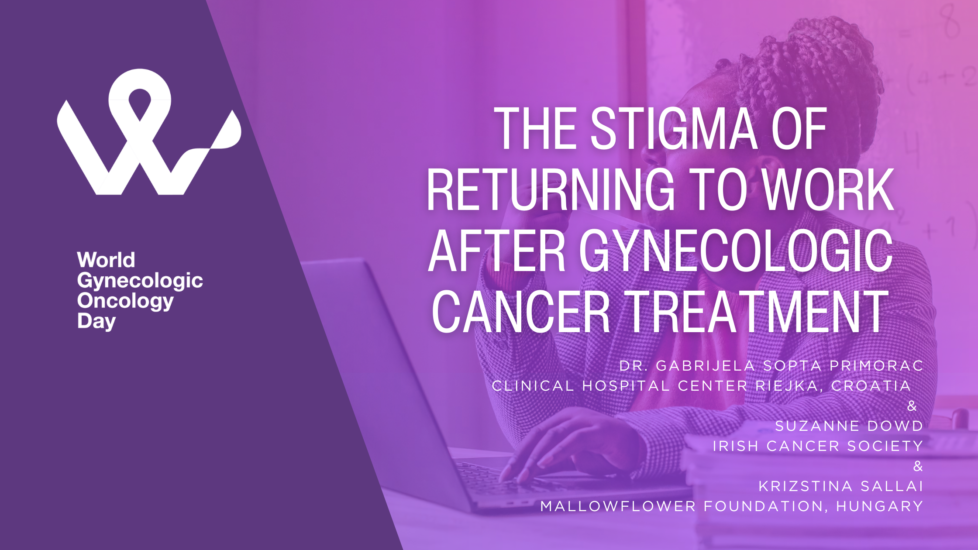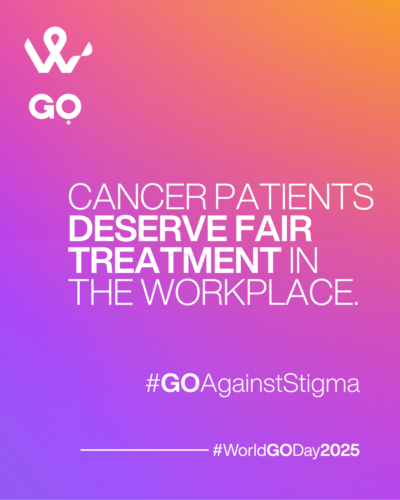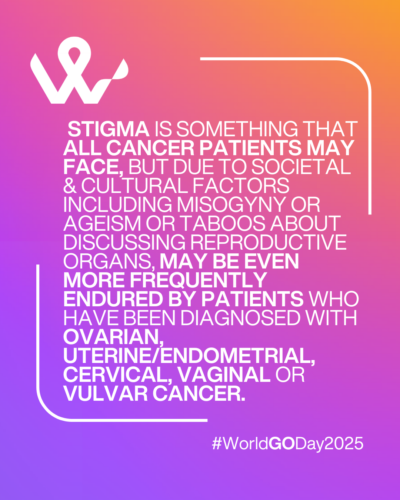
By Dr. Gabrijela Sopta Primorac, Croatia, Suzanne Dowd, Ireland & Krisztina Sallai, Hungary
Dr Gabrijela Sopta Primorac is a gynecologic oncologist, the ENYGO National Representative for Croatia and one of our Working Group members. Suzanne Dowd is an Advocacy Officer for the Irish Cancer Society. Krisztina Sallai is a patient advocate with the Mallow Flower Foundation in Hungary and a Working Group member.
Returning to work after cancer treatment is a significant step for women who have faced the physical, emotional, and social challenges of their disease. While reintegration into daily life is often encouraged, many women encounter stigma in the workplace, making their return more difficult and affecting their sense of belonging.
They face challenges about prejudices concerning their work ability. Employers and colleagues often assume that women who have undergone cancer treatment are physically weaker, less productive, or unable to handle work pressures. While some may experience temporary side effects like fatigue or cognitive difficulties ("chemo brain"), most are fully capable of working with reasonable adjustments. Also they often face fear of relapse and discrimination. There is often an unspoken fear among employers that the illness might return, leading to a lack of trust in the employee’s long-term work capability. Some women face subtle pressure to reduce their working hours, avoid taking on responsibilities, or even encounter obstacles in career advancement.
Survivors' quality of life can be improved by returning to work. One of the key factors influencing cancer survivors experience while returning to a workplace are the attitudes and perceptions of their colleagues and employers. Employee attitudes towards cancer survivors can impact a survivor’s reintegration to the workplace and productivity maintenance, but also can contribute to work satisfaction and shape the work environment. On one hand, perception of cancer survivors as vulnerable population, and concerns about absenteeism can contribute to conscious and unconscious biases, but on the other hand, supportive attitudes and inclusive policies can shape a supportive environment where survivors are empowered to return to work without stigma.

It is of great importance that employers adopt tailored support strategies, for example flexible working arrangements and empathetic communication. It is also crucial to have return-to-work policies. Support of women undergoing cancer treatment can have various forms and does not only concern their return to workplace.
One such example comes from Ireland, where the Leave our leave campaign triggered a monumental change in law, where women undergoing cancer treatment are now able to defer their maternity leave up to 52 weeks. This enables them to take the leave when they are better, rather than being forced to take it when they are too sick to enjoy time with their babies.
- Previously, women who were diagnosed with cancer while pregnant or recently post-partum could not postpone their maternity leave.
- One of the primary purposes of maternity leave is that it provides protected time for women to spend with their newborns.
- But the women affected were not afforded this right. Instead, they spent this precious time undergoing treatment, often bed bound and extremely unwell.
- The unfair legislative anomaly affected approximately 60 women in Ireland each year.
Role of patient organizations
- Patient advocates were involved with the campaign from the outset, tirelessly sharing their stories and advocating alongside the Irish Cancer Society. The official campaign launch took place outside government buildings in June 2022.
- Political alliances –A key element of this campaign and its success was building political support, across all political parties as well as independents.
Alongside patient campaigners, the Irish Cancer Society briefed the relevant spokespeople across the political spectrum highlighting what change in legislation was needed. In turn, those political actors spoke about the issue on the floor of the Parliament, in both chambers – the Senate and the Dáil, as well as discussing it with their colleagues and Party Leaders.
Two members of government brought their own piece of legislation (Private Members Bills). This is when elected representatives can bring their own draft legislation with the hope of progressing it through the various stage of the process.
- Solid legal evidence – The Irish Cancer Society received legal advice at the very beginning, before we launched the campaign publicly, to flesh out the legal basis and rationale for a change in legislation and any potential impact of that.
- Mixed media – the advocacy team worked closely alongside the communications team on how best to share the experiences of the women affected and the need for a change in legislation. Throughout the campaign there was a broad range of media coverage, from print, podcasts, social media. To mark the one-year anniversary since the launch of the campaign, the Irish Cancer Society released a video highlighting the impact of receiving a cancer diagnosis during pregnancy. This created another opportunity to engage with the media, wider public and elected representatives on the issue.
Another example of lifting the burden of cancer treatment comes from Hungary, where Government Decree 335/2009. (XII. 29.) was passed in 2019, which provides the opportunity for tax reductions for qualifying patients. By adopting this law, the state acknowledged that living with certain diseases is costly and imposes extra financial burdens on patients. Due to this successful lobbying activity the Mallow Flower Foundation is also trying to contact, negotiate and agree with employers on issues such as working time adjustments (e.g.. medical check-ups due to illness) or accomodating necesarry daily routines (e.g., more frequent toilet use due to self-catheterization).
Patient organizations and networks like ENGAGe represent crucial change leverage when it comes to policy changes if active in organising roundtables with policy-makers and making the change happen.
After treatment, many women feel vulnerable, and if they face negative attitudes or pity from colleagues, it can impact their self-esteem. Instead of being welcomed back as valuable team members, they are sometimes seen primarily through the lens of their illness. Cancer survivors also face lack of support and flexibility. Employers rarely make accommodations for women returning after cancer treatment, even though flexible working hours, remote work options, or a gradual return could significantly ease the transition. Some findings implicate that cancer survivors felt embarrassed and anxious, and feared being judged as no longer reliable while disclosing a cancer diagnosis while returning to work. Also, they feared being stigmatised about their personal behaviour, for example, their sexual behaviour, prior to a gynecological cancer diagnosis.
For some women treated with gynecological cancer, concerns about disclosure of diagnosis are based on perceptions of stigma about the type of cancer they were diagnosed with. While comparing their diagnosis to other cancer types, participants perceived gynaecological cancers as more potentially embarrassing and personal. There are findings that suggest that women were worried about gossip and speculation around the causes and treatment options for gynaecological cancers. They felt anxious and embarrassed, also described feelings of embarrassment for having undergone a hysterectomy, viewing this as a “woman’s thing”.

How can we reduce stigma?
- Educate Colleagues and Employers – Raising awareness that cancer treatment does not mean a loss of work capability and that most women can be just as productive after recovery.
- Legal and Institutional Measures – Strengthening labor protections and introducing support programs for women returning to work.
- Encourage Open Communication – Creating a workplace culture where women can openly discuss their needs without fear of discrimination.
- Individualized Approaches – Understanding that every woman’s recovery journey is different and offering flexibility in their return to work.
Fighting stigma is not just about solidarity—it is also about fostering a workplace culture that values diversity and supports employees through all life stages. For women treated for cancer, returning to work can be crucial for restoring a sense of normalcy and confidence, but only if their work environment recognizes and supports their abilities.



